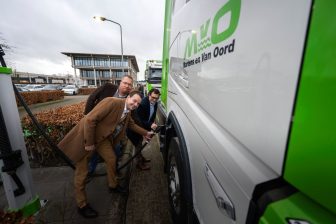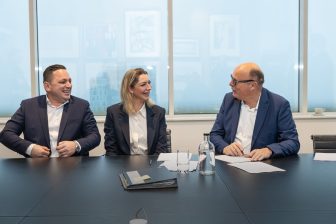Russia and the EU agree to promote energy efficiency
Reference: IP/06/1715
Brussels, Belgium – At the second meeting of the Permanent Partnership Council (PPC) on Energy in Moscow on 8 December 2006, the EU and Russia agreed to work together to enhance energy efficiency, recognising the huge mutual challenge and potential for energy savings that they quantify annually at around 400 million tonnes of oil equivalent each by the year 2020.
Moreover both sides highlighted the importance of enhancing mutual trust and confidence through an improvement in the investment climate, promoting infrastructure projects of common interest and enhancing the trade in energy products. They also agreed on the necessity of identifying ways to increase the complementarity of the energy policies of the EU and Russia over the longer term. In this context, they recommended that an efficient mechanism for the mutual exchange of information and data be established, which would promote the mutual appreciation of the energy situation the EU and the Russian Federation.
The main objective of the meeting was to examine the recommendations by four Thematic Working Groups established last year on investment, infrastructure, trade and energy efficiency and to agree on the priorities for future joint work. The PPC was chaired by Russian Energy Minister Viktor Krishtenko, with Mauri Pekkarinen, Minister of Industry and Trade of Finland representing the EU Presidency. The European Commission was represented by Commissioner Andris Piebalgs.
The main aim of the PPC is to ensure continued political impetus to EU – Russia energy cooperation in the framework of the successful Energy Dialogue. Energy cooperation is a crucial component of the relationship between Russia and the EU, and the PPC discussed ways of reinforcing this relationship and enhancing its mutual benefits. Russia is a major long time energy supplier to the European Union and the EU continues to be the most important market for Russian energy exports. Thus, there is a natural and growing partnership between the EU and Russia and both have shared interests in ensuring a safe, reliable and sustainable flow of energy.
The PPC recognised that energy security is an important challenge, both for suppliers and consumers, and that secure, diverse and sustainable energy supplies are a fundamental necessity for economic and social prosperity. The EU and Russia are key international players and enhancing mutual confidence and co-operation through an open and constructive discussion and exchange of information will help to address many of the real concerns and issues which exist.
The PPC welcomed the reports of the four joint thematic groups of experts on investments, infrastructures, trade and energy efficiency[1]. The PPC expressed its thanks to the members of the thematic groups for the excellent work achieved to date and underlined that the interaction between key players from government and industry has proven to be valuable and productive.
The PPC reviewed the reports and approved their recommendations for further work. These recommendations include closer work to compare energy strategies, forecasts and scenarios, moving ahead with implementing the detailed list of actions under the Joint Initiative on Energy Efficiency, further exchange of information and discussions on the practical workings of competitive energy markets and how the various instruments available can help to underpin energy security. They also included a more detailed consideration of the roadmaps on electricity market integration which have been proposed by the industry and the suggestion that joint proposals be prepared on those areas of specific concern to investors. In this context, priority should be given to analysing the factors hindering investments in order to permit the integration of energy markets through reciprocal participation of European and Russian companies throughout the whole energy chain, including through asset swaps.
Given the scope of the recommendations approved, it was agreed that the number of groups would be reduced to three, with one focusing on energy efficiency, another on market developments and a third on energy strategies, forecasts and scenarios. The PPC also discussed the next steps in the Joint Initiative in the field of energy efficiency and energy saving, taking note of the successful seminar on ESCO’s (Energy Service Companies) and gas flaring that was held on 26 October 2006 in Moscow. It was agreed that the Action Plan presented by the Thematic Group on Energy Efficiency formed a good basis, in particular the comparison of the legislative and regulatory frameworks in the area of energy efficiency and energy savings in order to exchange experiences and identify areas for improvement. The importance of reducing gas flaring was also discussed.
Bilateral cooperation in the context of other international organisations, mechanisms and agreements, such as the Energy Charter Treaty, the Kyoto Treaty, and the G8 was also discussed. The PPC acknowledged Russia’s work on energy security during its G8 presidency and welcomed in particular the G8 conclusions on Global Energy Security that were adopted at the Summit in St. Petersburg in July 2006, which established a clear set of energy security principles. The PPC underlined the importance of a determined follow-up of these commitments.
The Permanent Partnership Council (PPC) is a standard forum for discussing EU-Russia affairs. It consists of Ministers from Russia, the EU Presidency, the incoming EU Presidency, and a European Commissioner. This format allows full discussion of issues on which the EU and Member States share competency. It is also a small forum, facilitating decision-making, and can be called by the EU, or Russia.
This is the second PPC on energy. Other PPCs focus on foreign affairs, and on transport, environment, justice and home affairs.
In the framework of the EU-Russia Energy Dialogue, there are currently four joint ‘Thematic Groups’ on Investment, Infrastructure, Trade, and Energy Efficiency. These are composed of experts from the European Commission and EU Member States, the Russian administration, International Financial Institutions (EIB and EBRD) as well as EU and Russian business. These groups have each met regularly since June 2005, and have presented reports to this meeting of the PPC. One of the purposes of the PPC is to give political guidance to the work of the experts, and to define priorities for future work within the Thematic Groups.
[1] The full reports of the joint thematic groups are available at the following website: http://ec.europa.eu/energy/russia/reference_texts/thematic_en.htm
U las zojuist één van de gratis premium artikelen
Onbeperkt lezen? Profiteer nu van de introductieaanbieding voor € 10,- per maand.
Bent u al abonnee?



